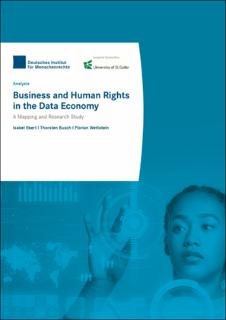Please use this identifier to cite or link to this item:
https://doi.org/10.21256/zhaw-26910Full metadata record
| DC Field | Value | Language |
|---|---|---|
| dc.contributor.author | Ebert, Isabel | - |
| dc.contributor.author | Busch, Thorsten | - |
| dc.contributor.author | Wettstein, Florian | - |
| dc.date.accessioned | 2023-02-11T10:11:30Z | - |
| dc.date.available | 2023-02-11T10:11:30Z | - |
| dc.date.issued | 2020 | - |
| dc.identifier.isbn | 978-3-946499-69-5 | de_CH |
| dc.identifier.uri | https://digitalcollection.zhaw.ch/handle/11475/26910 | - |
| dc.description.abstract | This study identifies novel challenges for human rights protection emerging from data-driven business conduct. It offers an overview of the current policy debate and emerging best practices for business to mitigate the impacts of data-driven business on human rights. A strong emphasis lies on the dynamic interlinkages between human rights issues in a data ecosystem, in particular addressing systemic bias in data models and establishing genuine stakeholder engagement. This mapping study serves as a conversation starter and aims at raising awareness regarding the data economy’s impact on human rights. On the one hand, the study could be used in a public policy context, e.g. to convince ministerial staff that “digital” human rights issues should also be part of National Action Plans on Business and Human Rights, or why the EU Digital Strategy can benefit from a rights-based approach. On the other hand, companies can use the study to engage in a dialogue with senior management on why a rights-based approach is relevant and should be mainstreamed across business, e.g. for a product counsel or a public affairs specialist. The study thus provides exploratory guidance for human rights impact and risk assessments and human rights due diligence. It addresses some core phenomena and technologies of the data economy and situates them within the social, cultural, and political contexts that explain their effects on human rights. The study presents the following key recommendations: − Business needs a life cycle approach to capture emerging and systemic human rights problems. This would allow it to identify, address and eradicate systematic distortions that have negative impacts on human rights in datafied environments. “Data universalism” needs to be replaced with context-specific, robust human rights due diligence processes that keep companies’ local embeddedness in mind. − Civil society may need to develop new methods to hold companies accountable for “digital” human rights violations. This point is closely connected to the public policy debate on the state duty to protect human rights, including digital rights. − Policymakers should take digital rights into account in policy proposals on human rights due diligence for business and revisit whether existing protection can still cover emerging digital issues. Legislators should strengthen digital rights in the coming years and strategically connect them to other legislative debates on human rights due diligence. This mapping can serve as a basis for a deeper examination of what all actors-states, companies, civil society organizations, national human rights institutions-can do to guarantee that digitalization and technological progress go hand in hand with the enjoyment and protection of human rights. | de_CH |
| dc.format.extent | 42 | de_CH |
| dc.language.iso | en | de_CH |
| dc.publisher | German Institute for Human Rights | de_CH |
| dc.rights | https://creativecommons.org/licenses/by-nc-nd/4.0/ | de_CH |
| dc.subject.ddc | 658.408: Sicherheitsmanagement, Umweltmanagement | de_CH |
| dc.title | Business and human rights in the data economy : a mapping and research study | de_CH |
| dc.type | Working Paper – Gutachten – Studie | de_CH |
| dcterms.type | Text | de_CH |
| zhaw.departement | School of Management and Law | de_CH |
| zhaw.organisationalunit | Center for Corporate Responsibility (CCR) | de_CH |
| zhaw.publisher.place | Berlin | de_CH |
| dc.identifier.doi | 10.21256/zhaw-26910 | - |
| zhaw.funding.eu | No | de_CH |
| zhaw.originated.zhaw | No | de_CH |
| zhaw.author.additional | No | de_CH |
| zhaw.display.portrait | Yes | de_CH |
| Appears in collections: | Publikationen School of Management and Law | |
Files in This Item:
| File | Description | Size | Format | |
|---|---|---|---|---|
| 2020_Ebert-etal_Business-and-Human-Rights-in-the-Data-Economy.pdf | 1.24 MB | Adobe PDF |  View/Open |
Show simple item record
Ebert, I., Busch, T., & Wettstein, F. (2020). Business and human rights in the data economy : a mapping and research study. German Institute for Human Rights. https://doi.org/10.21256/zhaw-26910
Ebert, I., Busch, T. and Wettstein, F. (2020) Business and human rights in the data economy : a mapping and research study. Berlin: German Institute for Human Rights. Available at: https://doi.org/10.21256/zhaw-26910.
I. Ebert, T. Busch, and F. Wettstein, “Business and human rights in the data economy : a mapping and research study,” German Institute for Human Rights, Berlin, 2020. doi: 10.21256/zhaw-26910.
EBERT, Isabel, Thorsten BUSCH und Florian WETTSTEIN, 2020. Business and human rights in the data economy : a mapping and research study. Berlin: German Institute for Human Rights
Ebert, Isabel, Thorsten Busch, and Florian Wettstein. 2020. “Business and Human Rights in the Data Economy : A Mapping and Research Study.” Berlin: German Institute for Human Rights. https://doi.org/10.21256/zhaw-26910.
Ebert, Isabel, et al. Business and Human Rights in the Data Economy : A Mapping and Research Study. German Institute for Human Rights, 2020, https://doi.org/10.21256/zhaw-26910.
Items in DSpace are protected by copyright, with all rights reserved, unless otherwise indicated.